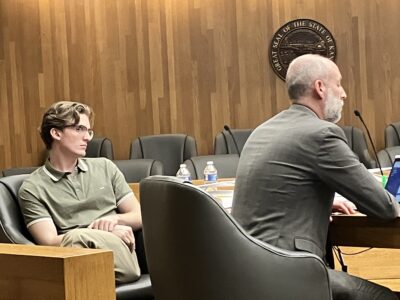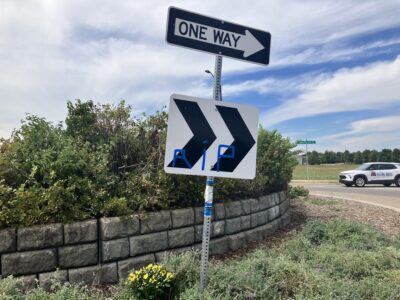Jury hearing case of man accused of aggravated criminal sodomy for allegedly arranging illicit sexual encounter between brother and teen girl

photo by: Kim Callahan/Journal-World
Wyatt Farrow, left, appears with his attorney, Cooper Overstreet, Wednesday, Sept. 3, 2025, in Douglas County District Court.
The Douglas County District Attorney’s Office is trying a young man this week for aggravated criminal sodomy of two teens, one of them his brother.
The case is unusual in that the defendant, Wyatt Farrow, is never alleged to have inappropriately touched either teen, and one of the teens — the brother, 17 at the time — told a jury Wednesday that his older brother had not victimized him in any way.
“Do you think your brother did anything wrong?” defense attorney Cooper Overstreet asked the younger brother, Everett Farrow.
“No,” said Everett, who was testifying as a state witness under a grant of immunity, meaning that nothing he said could be used against him.
The DA’s Office granted the immunity after originally charging — and then dismissing — a sex crime against Everett himself.
The other alleged victim in the case, a woman who was 17 at the time of the incident in February 2022, told the jury that she had attended a sleepover at the brothers’ house, where a close female friend of hers — Wyatt’s girlfriend — also lived.
She said that the evening included consensual kissing between her and Everett as part of a truth-or-dare game but that it later, and somewhat mysteriously, escalated into nonconsensual sexual activity between her and Everett in the older brother’s bedroom.
Everett testified that all of the sexual activity between him and the teen girl was consensual and that she had largely initiated it both before and after he had gone to his brother’s room to sleep off his intoxication.
The state’s theory of the case, delivered in a brief opening argument, is that the older brother, Wyatt, had intended from the start of the evening for Everett to be with a girl for the first time, that he had engineered the whole encounter and at times had coached him through it, coming in and out of the bedroom where the teens were and at one point delivering a vibrator for Everett to use.
The state, represented by Senior Assistant District Attorney Ricardo Leal, presented text messages from Wyatt, then 19, to the boys’ father, Anthony Farrow, asking him to bring home flavored vodka for the sleepover participants, mentioning the teen girl by name.
“The alcohol is for a good cause,” Wyatt texted Anthony before sending another message that read: “Everett might just finally kiss a girl.”
The father testified on Wednesday that he did not reply to the messages or bring home the requested alcohol. He said his Lawrence home already had a fully stocked bar. He acknowledged, though, that he was found guilty last summer of unlawfully hosting the minors who were consuming alcohol that night.
The jury heard video of the woman from that night, after the alleged crime, in which she was talking to Wyatt and appeared to be very inebriated. A judge at an earlier hearing in the case described the video as undoubtedly “showing a very drunk young girl.”
Yet the woman testified on Wednesday that she had consumed only one shot of vodka and a small sip of seltzer with a “gross flavor” earlier in the evening, and a KBI toxicologist said her blood later tested negative for alcohol. The woman seemed at a loss to explain why she felt “heavy” and “woozy” after sipping the seltzer and was unable to remember segments of the evening, including how she came to be naked in bed and how it was that in some cases she recalled things that were said to her but not what she had said to others.
A detective on Wednesday testified that the woman told her she had “slipped in and out of consciousness” during the course of the sexual activity, which the woman said had included painful biting.
But when defense attorney Overstreet asked the woman if she thought she might have had a disorienting concussion from falling against a pool table earlier in the evening or if she thought her drink might have been drugged, she said she had no evidence of that. When he asked her if she had been drunk in the video, she said, “I don’t know.”
She testified that she felt like she had no physical control of her body during the encounter and that she did not consent to any sexual activity beyond the initial kissing.
In the video made by Wyatt, the woman appears very confused about what had just happened, fearing a possible pregnancy, regretting that Wyatt had seen her naked and even asking Wyatt, “Oh my God, did I rape Everett?”
Wyatt tells her that no one raped anyone, not to worry, that it’s all good and that he, Wyatt, is “basically a therapist.”
Wyatt later indicated that he made the video in the bathroom so that there could be no mistake about what had happened, she said.
In a text conversation after the woman had reported the incident to police, Everett indicated that Wyatt had indeed planned an encounter of some sort between Everett and the teen girl, putting them in bed together and bringing a vibrator to him, but on the stand Wednesday he said that no plan had existed and that he was just saying things in the texts to cover his embarrassment over being sexually inexperienced and seeming to require his brother’s coaching.
A police detective testified on Wednesday that a review of text messages between Wyatt and his girlfriend did not include any evidence of a planned assault or of “confessional” matter after the fact.
The prosecutor, Leal, asked Everett if he believed he was too drunk to consent to sex, and Everett said no.
“I was capable of making my own decisions,” he testified, again denying that he had been manipulated by his older brother.
He also testified that the sexual activity with the teen girl was awkward and embarrassing but consensual and that he believed at the time that the girl enjoyed it.
Wyatt faces two felony counts of aggravated sodomy, two felony counts of furnishing alcohol to a minor and one misdemeanor count of hosting minors consuming alcohol. He is free on a $50,000 bond.
At the conclusion of the state’s case Wednesday, Overstreet moved for a judgment of acquittal on the four felony counts, arguing that the state had not put on sufficient evidence for the case to go to a jury, but Judge Amy Hanley denied that motion and ordered everyone back to the courtroom Thursday morning, when the trial will resume.






